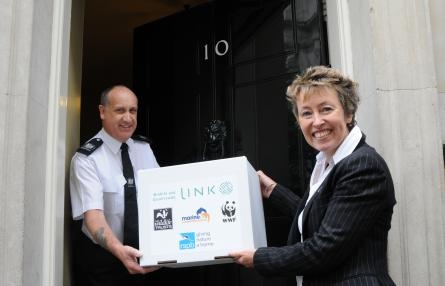
Joan Edwards, Head of Living seas presents signatures to 10 Downing Street

Joan Edwards, Head of Living seas presents signatures to 10 Downing Street
At midday on Wednesday 12 June, four leading nature conservation charities (1) stood shoulder to shoulder to present pledges to Downing Street calling for an ecologically coherent network of Marine Protected Areas.
More than 350,000 people signed pledges – often in creative ways, at aquaria and seaside events where they made sand and willow sculptures or created silver-scaled marine creatures.
This public support provides Government with the mandate for swift and effective action. So has the Science and Technology Select Committee’s recent report on Marine Science, which concluded that the creation of new Marine Conservation Zones is vital to protect and restore the marine environment. We agree that protected areas are one of the best tools to protect marine wildlife effectively and restore our seas to their full potential following decades of neglect and decline.
The charities are extremely concerned that:
• While there is huge public support for greater protection of our seas using Marine Protected Areas, there has been little evidence that the Government will do this on a meaningful scale for English waters or with any sense of urgency.
• A two and half year public consultation process involving one million stakeholders recommended the establishment of 127 Marine Conservation Zones in English seas across England but the Government is currently only suggesting 31 should be designated . The charities and Government’s own scientific advisors agree that a full, ecologically coherent network is absolutely vital to ensure the future of our seas. There is uncertainty over how committed the Government is to progressing future tranches of Marine Conservation Zones. All four charities are calling on the Government to commit to a specified timetable designating an entire network.
• Government’s nature conservation advisors have said that many of the recommended Marine Conservation Zones are under severe threat of damage but Government has no plans to take proactive action to protect these sites now despite the known decline to marine biodiversity.
• A whole swathe of important marine wildlife is not being considered by the Government. Marine Protected Areas are also needed for mobile species – such as whales, dolphins, basking sharks and seabirds – in order to create a network that is truly ecologically coherent.
A spokesperson for the four charities said “The Marine Conservation Society, the RSPB, The Wildlife Trusts and WWF all agree that the most important action Government can take nationally to address the shocking state of nature at sea to urgently designate an ecologically coherent network of Marine Protected Areas. We call on Government to avoid further delays and publish their timetable for completing the ecologically coherent network now”
The joint petition comes in the wake of the recently published State of Nature report put together by scientists working side-by-side with 25 wildlife organisations. They compiled a stock-take of our native species – the first of its kind in the UK – and revealed that 60% of all terrestrial and marine animal and plant species studied have declined in the past 50 years, with seabirds, harbour seals, sharks, skates, rays suffering particular declines, along with large-scale damage to sub-tidal habitats. Protected areas for marine wildlife are a key tool to help reverse this trend and thus meet our international biodiversity targets.
We were pleased to hear that the Minister is keen to move the Marine Conservation Zone process forward, but we have not seen this intention translated into actionHouse of Commons’ Science and Technology Committee on Marine ScienceApril 2013
In April, the House of Commons’ Science and Technology Committee on Marine Science concluded its report (2) saying:
“We were pleased to hear that the Minister is keen to move the Marine Conservation Zone process forward, but we have not seen this intention translated into action. The Minister should not let his priorities be set by fear of judicial review. Further delay to the process perpetuates the uncertainty that has already been damaging to the Marine Conservation Zone project. We recommend that Government set out a clear timetable for designation of this tranche and future tranches of Marine Conservation Zones, with a clear commitment to an end date by which the ecologically coherent network of marine protected areas, as the Marine and Coastal Access Act 2009 requires, will be established.”
ENDS
Editors’ notes
1. The four leading nature conservation charities calling for the urgent designation Marine Protected Areas are Marine Conservation Society, Royal Society for the Protection of Birds, The Wildlife Trusts, and WWF working together through Wildlife and Countryside Link.
2. Please contact us if you would like to see the booklet that accompanies this release.
3. The House of Commons’ Science and Technology Committee report on Marine Science published its report in April 2013.
4. Working together through Wildlife and Countryside Link (registered charity no 1107460)
5. Marine Protected Area (MPA): is a general term to describe an area of the sea or coast where management measures are put in place to protect habitats and wildlife.
Marine Conservation Zone (MCZ): is a new type of MPA designation created by the Marine and Coastal Access Act 2009. MCZs can be designated anywhere in English and Welsh inshore and offshore waters.